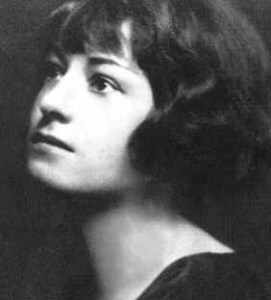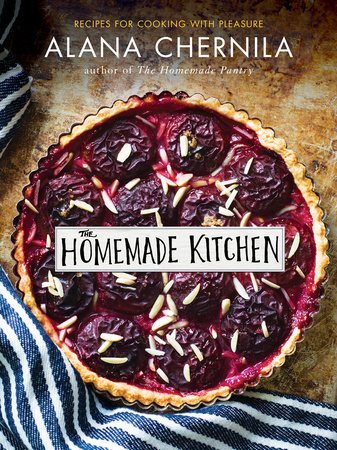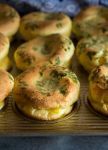Recipe: Popovers
 I’ve long been fascinated by popovers and for this, I blame Dorothy Parker.
I’ve long been fascinated by popovers and for this, I blame Dorothy Parker.
 Dorothy Parker
Dorothy ParkerFor those unfamiliar, Dorothy was a fabulously wry writer who was among the founding members of “the vicious circle” of writers who made up The Algonquin Roundtable in New York. Starting in 1919, the group of thirty newspaper and magazine writers met almost daily for lunch over the course of about ten years to share gossip, jokes and cultural observations.
Through their writings, the conversations around their lunch table in the dining room became national fodder. Dorothy, in particular, became known for her remarkable wit. The group led to the creation of a magazine that you may have heard of, The New Yorker.
Many went on to celebrated careers. Parker sold three books of acclaimed poetry, won an O. Henry Award for her short story, “Big Blonde,” and was nominated for an Oscar for co-writing 1939’s “A Star is Born.” While she lived a public life of acclaim, her internal life was often tortured and she slipped into alcoholism late in life. Parker has been one of my favorite writers since I was introduced to her work in high school. Her humor, use of sharp descriptions and subtlety in commenting on important issues still inspire me today.
Popovers and the Vicious Circle
As a food writer, I did some research on what the group ate during their ten-year lunch. It was the usual fare of the 1920s, continental dishes influenced by French. Shrimp cocktails, cold fish cakes with lemon cream sauce, various cuts of beef in red wine sauce, that sort of thing. The hotel manager, happy that the group made its home there, offered them a regular table and waiter along with two enduring food items served gratis: celery and popovers. Popovers? I always wondered why.

The Algonquin has a special place in my heart. When my first book, The Sharper Your Knife, was on its way to auction, I traveled to New York to meet with the ten publishers (yes, ten) who wanted to buy it.
As a Dorothy Parker devotee, my husband thought that staying at the city’s most celebrated literary hotel would offer good karma and he found a great last-minute deal for a room online. My agent and I went around to meet with seven publishers one day and three the next.
And Here’s How I Learned I Sold My First Book
After the whirlwind, I packed up and met my long-time friend J.R. in the hotel’s dark wood-paneled bar for a cocktail before catching a flight home. I tried to be cool, but I was mystified at how this improbable moment could possibly be happening. It felt as if I had somehow stepped into another person’s life. J.R. and I talking about the popovers and the auction expected to take place the following week when my phone rang.
“So a publisher wants to pre-empt the auction,” my agent explained. A pre-empt happens when a publisher offers an advance as high or higher than a manuscript is expected to raise at auction. I asked him what I should do. “I think you should take it!” he said enthusiastically. So I did, and the auction was over.I hung up. I explained that I’d just sold my book to the waiter. With great flourish, he and the manager brought over two glasses of champagne on the house… and a basket of warm popovers. “We overheard you talking about them, and we have them on the menu at the moment,” the manager explained, a bit awkwardly, admitting to eavesdropping. “I hope it’s OK.” I asked him, why did they serve popovers to the round table members?“Because they’re delicious?” he offered.We toasted to the book sale, and ate popovers. They were awfully good.

Popovers – At Last!
Oddly, however, I’ve never made them — until a couple weeks ago. I’ve been collecting audio interviews for a podcast that I’m planning to launch soon. One of my first interviewees was Alana Chernila of the lovely blog, Eating from the Ground Up. She arrived in the midst of a busy book tour on a crisp autumn morning to hang out in my kitchen. I wanted to make something from her new book, The Homemade Kitchen, so imagine my delight when I saw she had a recipe for popovers.
It turns out that popovers are remarkably easy to make – and cheap. You put the ingredients into a blender, puree it and pour into an oiled muffin or popover tin. The hardest part is not opening the oven while the bake. I had some fresh dill on hand, so that’s what I used along with chevre. Alana and I sat in my kitchen, drinking tea and talking popovers and book tours. I’ve added them to my Thanksgiving menus for approximately forever. It reminded me that sometimes we wait too long to try things, only to find they were so easy. All I needed was a few ingredients and some patience. Oh, and a blender. Listen to my conversation with Alana on my podcast, Hungry for Words, with the player at the top of the page. PrintRecipe: Popovers from ‘A Homemade Kitchen’I have one back-pocket recipe that can save any breakfast, lunch, or dinner. Special birthday breakfast on a school morning when we have to get out at 7:00 a.m.? Popovers. A soup pulled from the freezer that’s not quite as delicious as I remember it? Serve with popovers. Friends coming over with picky kids? Anything + popovers. Of course, I wish all my meals were flawless and delicious, and all my experiments came out cookbook-worthy. But for the meals that do n’t quite make it, popovers save the day. This is also a great recipe for kids, because once it’s in your blood, you can rely on it for life. The blender, along with the hot oven, creates a lofty popover with a hollow center. Although you can buy a special fancy popover pan, this recipe works just fine in a regular muffin tin. If you prefer a more custardy popover, mix the ingredients by hand and bake in a 375°F oven for 30 to 35 minutes.Course BakingCuisine AmericanPrep Time 10 minutesCook Time 28 minutesTotal Time 38 minutesServings 12 popoversAuthor Alana ChernilaIngredients3 large eggs1½ cups 360 ml whole milk or buttermilk (for homemade, see page 34)1½ cups 180 g all-purpose flour½ teaspoon kosher salt4 tablespoons ½ stick/56 g unsalted butter, melted and slightly cooledSafflower oil or melted butter for greasing the panOptional: ¼ cup fresh herbs; 4 ounces 115 g chèvreInstructionsPreheat the oven to 425°F. Combine the eggs, milk, flour, salt, and butter in a blender. Blend until you have a smooth batter, 15 to 20 seconds. Let the batter rest for about 10 minutes.Generously grease a 12-cup muffin or popover tin with oil. Divide the batter evenly among the cups, filling them most of the way. Add a pinch of fresh herbs and a dollop of chèvre, if using, to the center of each muffin cup. Bake until puffed and golden, WITH OUT OPENING THE OVEN, 25 to 28 minutes. Serve immediately.
PrintRecipe: Popovers from ‘A Homemade Kitchen’I have one back-pocket recipe that can save any breakfast, lunch, or dinner. Special birthday breakfast on a school morning when we have to get out at 7:00 a.m.? Popovers. A soup pulled from the freezer that’s not quite as delicious as I remember it? Serve with popovers. Friends coming over with picky kids? Anything + popovers. Of course, I wish all my meals were flawless and delicious, and all my experiments came out cookbook-worthy. But for the meals that do n’t quite make it, popovers save the day. This is also a great recipe for kids, because once it’s in your blood, you can rely on it for life. The blender, along with the hot oven, creates a lofty popover with a hollow center. Although you can buy a special fancy popover pan, this recipe works just fine in a regular muffin tin. If you prefer a more custardy popover, mix the ingredients by hand and bake in a 375°F oven for 30 to 35 minutes.Course BakingCuisine AmericanPrep Time 10 minutesCook Time 28 minutesTotal Time 38 minutesServings 12 popoversAuthor Alana ChernilaIngredients3 large eggs1½ cups 360 ml whole milk or buttermilk (for homemade, see page 34)1½ cups 180 g all-purpose flour½ teaspoon kosher salt4 tablespoons ½ stick/56 g unsalted butter, melted and slightly cooledSafflower oil or melted butter for greasing the panOptional: ¼ cup fresh herbs; 4 ounces 115 g chèvreInstructionsPreheat the oven to 425°F. Combine the eggs, milk, flour, salt, and butter in a blender. Blend until you have a smooth batter, 15 to 20 seconds. Let the batter rest for about 10 minutes.Generously grease a 12-cup muffin or popover tin with oil. Divide the batter evenly among the cups, filling them most of the way. Add a pinch of fresh herbs and a dollop of chèvre, if using, to the center of each muffin cup. Bake until puffed and golden, WITH OUT OPENING THE OVEN, 25 to 28 minutes. Serve immediately.The post Recipe: Popovers appeared first on Kathleen Flinn.



